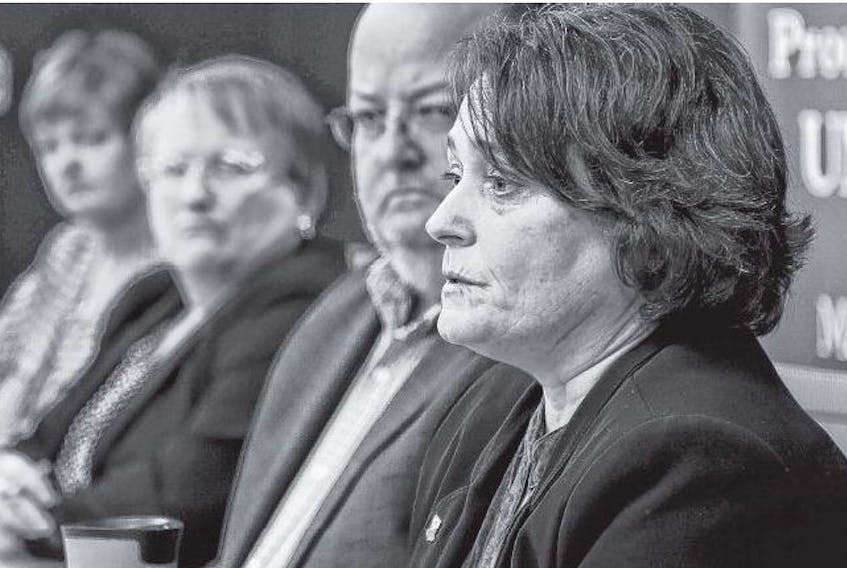Labour unions representing thousands of education support workers, bus drivers, early childhood educators and more on Tuesday backed the Nova Scotia Teachers Union in its battle with the province over the implementation of the recommendations of the Avis Glaze report.
The support came on the same day members of the NSTU across the province voted online on whether to give the union’s executive a strike mandate, even though any job action would be illegal. Results of the strike vote will not be released until after the NSTU provincial executive meets to discuss it Wednesday.
While NSTU president Liette Doucet said the executive will also decide whether any job actiontakes place at all, she did say there are a wide range of options.
“There are any number of possibilities,” Doucet said. “We could do a rotating strike, we could do work to rule, we could do a full walkout, we could do a one-day walkout. There are a number of possibilities. It will all depend on the plan we look at (Wednesday).”
She said it’s possible the executive could decide on Wednesday to do some form of job action onThursday but the union would take into account that parents would need advance notice.
“That’s part of the decisionmaking process that will come through our provincial executive. However, I can say that we are always concerned with student safety and we do believe that parents need some type of leeway in order to arrange for child care. I can’t tell you whether or not 48
hours notice will be given or not but I expect that some notice would be given so that parents can make arrangements that are necessary.”
Education Minister Zach Churchill said on Tuesday afternoon that a strike or other job action would not be in the best interest of schoolchildren.
“School disruption doesn’t help them,” he said. “It doesn’t help them learn more or do better. The changes we’re moving forward with, I believe, will actually help us do better for our kids and, again, at the end of the day, that’s where all of our focus needs to remain. That’s the reason every one of us has a job in the education system, to serve our students.”
Representatives of the Nova Scotia Federation of Labour, Canadian Union of Public Employees, Nova Scotia Government and General Employees Union and the Service Employees International Union Local 2 joined Doucet at a news conference on Tuesday to address the ongoing dispute.
Labour federation president Danny Cavanagh said the union leadership present — NSGEU president Jason MacLean, CUPE Nova Scotia president Nan Mac-Fadgen, SEIU Local 2 secretarytreasurer Cathy Retieffe and Doucet — together represent about 17,000 members who work in the public education system.
“This government restructuring is really much larger than teachers and administrative staff. It has implications for support staff in schools across Nova Scotia,” Cavanagh said. “Restructuring school boards will create greater instability in labour relations, relations already strained in the province. Any restructuring will just create massive disruption for thousands of union members who work on the front lines and for the system itself.”
Besides teachers and school administrators,those affected include educational assistants,teaching assistants, faculty operators, secretaries, school bus drivers, mechanics,caretakers, custodians, building specialists,
janitors and maintenance workers, librarians and librarian assistants, cafeteria workers, community outreach workers, tradespeople, lunch and grounds supervisors, early childhood educators and other support positions in the boards, he said.
“We’ll stand solid behind whatever the teachers want to do,” Cavanagh said. “But our message to the government is bring us to the table. Let us be part of this decision-making process because taking the legislative hammer, once again, to the unions of this province doesn’t work, hasn’t worked and creates chaos in the system.”
Churchill said nothing will change for those affected by regional collective agreements.
“So any NSGEU members in the education system, CUPE members, bus drivers, those doing custodial service, any one of those people, these changes will not impact their contracts,” he said.
He also said the lines of communication regarding the implementation of the Glaze report recommendations will stay open.
“We, of course, have to work together, even through our moments of disagreement, to make sure that we’re all doing our very best for our kids. At the end of the day we can disagree on things but we all know that we’ve got an obligation, we’ve got a collective responsibility to do better for those kids that need a stronger education system.”
Among the major concerns about the planned changes to the education system is the elimination of the province’s Englishlanguage school boards in favour of a provincial advisory council and the removal of principals and vice-principals from the NSTU.
McFadgen said there are contract negotiations underway with every school board in the province for the 4,000 members CUPE represents.
“Even if we do bargain something, what weight does it have? Does it have weight? Maybe it does, maybe everything is fine. Maybe it’s not. We don’t know. Nobody will tell us,” McFadgen said in an interview before Tuesday’s news conference.
Churchill said there’ll be no impact on that process.
“The regional operational units will remain as entities and will be able to continue on in terms of implementing those collective agreements,” he said.
The minister said the department remains committed to improving the system for students.
Later on Tuesday, the NSTU released a link to a third-party review of the Glaze report that calls the analysis into question.
The review was conducted by Greg Thompson, associate professor and research ethics adviser for Queensland University of Technology in Australia, and David Rutkowski, an associate professor in educational policy at Indiana University, according to the release.
The third party review can be read here: //bit.ly/2Gw6znH In the release, Doucet said the review reinforces the concerns of parents and community members. “Responsible governments do not turn public education upside down based on a single hastily prepared consultant’s report and little to no public dialogue,” Doucet said. “The approach taken by the McNeil government and Minister Zach Churchill to this point is not conducive to good public policy. The government needs to put a halt to its upcoming legislation and work with Nova Scotians if it wants to createpositive change.”









